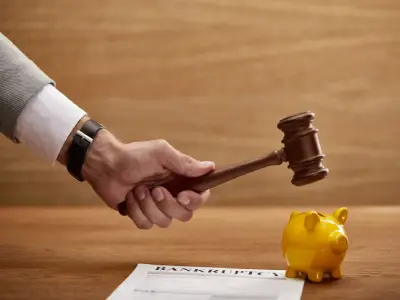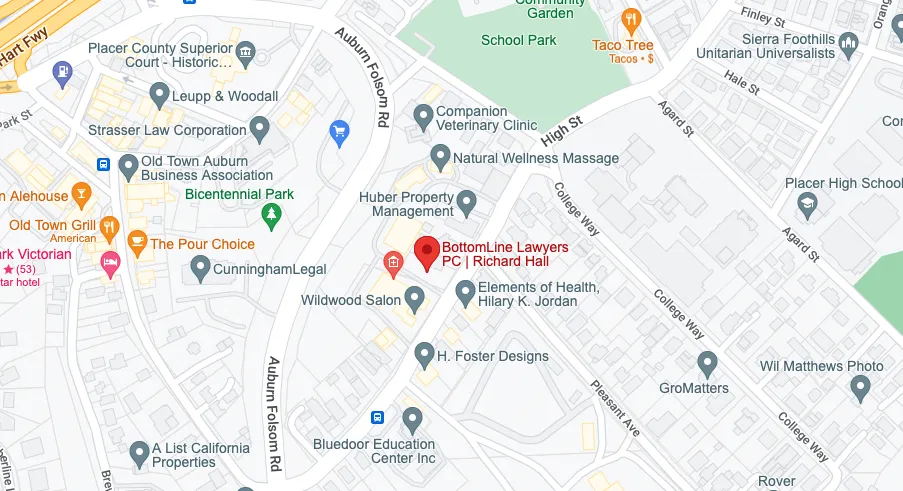Chapter 13 Exemptions Attorney in Auburn, CA
Exemptions from bankruptcy help filers a fresh start by allowing them to keep property necessary to keep their homes and jobs. The amount a debtor needs to pay to a Chapter 13 repayment plan is also determined by these exemptions.
Even if a filer under Chapter 13 can keep all their possessions, there are charges. Any non-exempt property items not protected by an exemption must be paid for by the debtor in the three- to five-year repayment schedule.
Bankruptcy law can be confusing, so you need an attorney. Contact our reliable California Chapter 13 bankruptcy exemptions attorneys if you need help which bankruptcy chapter suits you.
We will help you get a fresh start. One call can make a difference. Call us for a free initial consultation, or visit our law office in Auburn, CA!
Why Do I Need a Bankruptcy Attorney in Auburn, CA?
 If you’re considering bankruptcy, you should consult an experienced bankruptcy lawyer who can help you handle the process. The bankruptcy laws can be challenging to understand, but with the help of an attorney, you can file for bankruptcy more successfully and quickly.
If you’re considering bankruptcy, you should consult an experienced bankruptcy lawyer who can help you handle the process. The bankruptcy laws can be challenging to understand, but with the help of an attorney, you can file for bankruptcy more successfully and quickly.
You could file for bankruptcy independently, but doing so would only harm your case. The advantages of having a bankruptcy attorney are as follows:
- They can fight on your behalf – Your bankruptcy petition will be properly filed with the help of a lawyer. They can assert and fight for your legal rights in the courtroom.
- They know your bankruptcy options – Many people struggling with extreme debt may find bankruptcy frightening. Fortunately, a bankruptcy lawyer will thoroughly assess your complete case. After thoroughly evaluating your debts and assets, your attorney will give you the finest bankruptcy plan.
- They will save you energy, money, and time – A bankruptcy attorney may help you select the right set of exemptions for your case and minimize your exemptions so you can keep more of your property after filing for bankruptcy.
It is crucial to have peace of mind. Bankruptcy can cause severe stress, so you need an attorney to handle your burden. Contact our best Bottomline bankruptcy lawyers today!
What are the Bankruptcy Exemptions in California?
Since bankruptcy is a federal procedure, it operates uniformly across all states. California state law applies to protect your property.
Although most states do not permit filers to select bankruptcy exemptions, California filers are lucky because the state provides two exemption sets. You may also use the federal non-bankruptcy exemptions along with the state sets.
Filing bankruptcy petitions can be stressful, so we are here to help. We are well-versed in the bankruptcy code and will help you protect your assets. Contact us today for bankruptcy relief!
Exemption Sets
For you to understand this legal matter, we have outlined the notable distinctions between the two California exemption sets:
California 703
The ideal filers for California’s 703 exemptions are those who don’t own a home or have little to no equity in one. In addition to the fact that most people can protect all of their substantial household goods, this exemption set offers an extensive wildcard exemption to secure any item of your choice, including luxuries often excluded from bankruptcy protection.
For instance, you could choose the 703 exemptions if you own an expensive car outright, have saved up for retirement, or have a valuable collection but don’t own anything else.
California 704
California’s 704 exemptions protect a large portion of home equity, all necessities for daily life, personal injury claims, and business-related equipment. In return, filers must give up luxury possessions like a boat, RV, or expensive car. However, the exemptions for jewels, heirlooms, and artwork are particularly generous.
List of California Bankruptcy Exemptions
The following are the bankruptcy exemptions in California:
- Motor Vehicle Exemption
- Homestead Exemption
- Wildcard Exemption
- Retirement Account Exemptions
- Personal Property Exemptions
- Public Benefit Exemptions
- Insurance Benefit Exemptions
- Available Federal Exemptions
More California exemptions are available. As with other exemptions, it is best to consult legal counsel to confirm the most recent amounts and eligibility standards.
We will evaluate your case at Bottomline Lawyers and make sure to secure your assets. Our California Bankruptcy Exemption lawyer can represent you in bankruptcy court if needed. Call us today!
What Happens To Property You Are Unable to Exempt?
That will depend on the chapter you submit. If you file for Chapter 7 bankruptcy, you lose any non-exempt property. The bankruptcy trustee overseeing your case will sell the property for the benefit of your creditors.
If you file for Chapter 13 bankruptcy, all your possessions are yours, but luxury items have a monetary cost. Any property not covered by an exemption under your Chapter 13 repayment plan will be valued and paid to your creditors.
Our reliable bankruptcy attorney can help you assess your case and choose the right chapter that suits your situation. Contact us today!
Chapter 13 Bankruptcy Exemptions in California
You can protect and keep items like furniture, some of the equity in your home and car, and a qualified retirement account with the help of bankruptcy exemptions. However, exemptions do not apply to non-essential luxury purchases like non-exempt properties like yachts or holiday homes.
Exemptions secure valuable assets in both Chapter 7 and Chapter 13 while ensuring that creditors receive their just compensation. However, each chapter approaches this in a somewhat different way:
- A “liquidation” chapter of bankruptcy is Chapter 7. Suppose you cannot claim an item as exempt under this chapter. In that case, the bankruptcy trustee assigned to the case will sell the asset, repay any exemption money you are owed, and pay your creditors with the proceeds after deducting sales expenses.
- A “repayment” bankruptcy chapter is Chapter 13. The trustee for Chapter 13 won’t liquidate your non-exempt assets. Instead, the non-exempt amount will be paid to your unsecured creditors as part of your repayment plan.
The value of the non-exempt property is paid to the creditors in both chapters. This approach ensures that creditors receive the same amount in a Chapter 13 case as they would have in a Chapter 7 case.
If you are facing any financial issues, contact our best bankruptcy attorney. Get bankruptcy relief today!
Calculating a Chapter 13 Repayment Plan Payment
In a Chapter 13 bankruptcy, you plan to pay back some or all of your debts through regular payments to a bankruptcy trustee to keep a car, home, or other collateral. Many technical regulations go into a repayment plan, but the total you are going to pay will depend on your:
- Assets
- Monthly costs of living
- Amount and kind of debt that you owe
- Income
Take note that you can also catch up on secured debt payments. That is one advantage of Chapter 13 bankruptcy that isn’t present in a Chapter 7 case. Through a three- to five-year repayment plan, Chapter 13 bankruptcy enables you to spread out missing payments and prevent foreclosure or repossession.
The automatic stay prevents creditors from reclaiming your property while you work to cure your default. You’ll catch up on your payments after you complete your plan.
Steps on How to Calculate your Chapter 13 Repayment Plan Payment
The following are the steps how to calculate your Chapter 13 repayment plan payment:
- The first step is calculating your disposable income by subtracting allowable expenses from your monthly take-home pay. Then, multiply your disposable income by the months in your repayment schedule.
- Finding the worth of your non-exempt assets is the second step. Each state permits filers to preserve a certain amount of property using the state’s bankruptcy exemptions. The assets that a bankruptcy exemption cannot protect are known as non-exempt assets. Your repayment plan in Chapter 13 must include paying your creditors the value of your non-exempt assets.
- The third step is to choose which debts you must completely repay as part of a Chapter 13 plan. These debts include past-due car and mortgage payments (if you intend to maintain the vehicle), current income tax debt, and support arrears.
Once completed, you will be expected to pay the greater of the following over the term of your plan:
- The total value of your non-exempt property and the total amount of your unpaid debts
- Your disposable income
The steps can be confusing, and you need an attorney who can guide you every step of the way. Contact our top-notch California bankruptcy lawyers today for a case evaluation.
We handle every bankruptcy case diligently and will help you secure your personal property. We can also help you create a repayment plan that is best for you! Call us today!
Chapter 13 Bankruptcy Repayment Increase
You must completely repay some debts as part of your Chapter 13 plan. These include unpaid taxes and priority debts like arrears on mortgages.
However, your income, expenses, and non-exempt assets determine how much you will have to pay your general unsecured creditors (such as credit card companies). You are specifically obligated to compensate with all your disposable income, which is the amount left over after considering permitted living costs.
Therefore, even though you retain your non-exempt assets, your repayment plan may require you to pay unsecured creditors a higher price.
Call our Reliable California Bankruptcy Exemption Lawyer Today!
Bankruptcy can be the only remedy to some people’s financial problems, but it should not be taken lightly. Our reliable bankruptcy attorneys at Bottomline Lawyers PC will assist you in negotiating with your creditors.
We will also help you build the best bankruptcy payment arrangement for your situation. Another essential step in the bankruptcy procedure is receiving appropriate legal counsel since there is too much at stake.
We also deal with legal issues such as Estate Planning, Tax Resolution, Business Formation and Counseling, and LGBTQ+ Bankruptcy.
One move can make a difference. Legal help is now at the end of your fingertips. Contact us today, or visit our law office in Auburn, CA!


